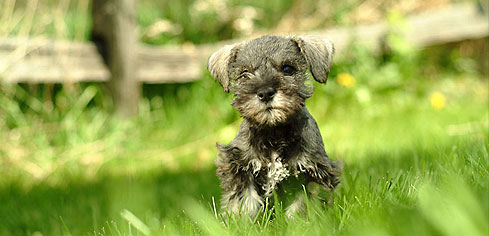 |
Dental Care |
Thought humans were the only one who needed dental attention? Dogs need regular dental care too!
Here are some things you can do to keep your dogs’ teeth healthy:
- Clean your puppy's teeth 2 or 3 times a week. In a cup of water, pour a teaspoon of baking soda and with this solution, gently rub the puppy's teeth with a soft cloth.
- When your dog gets his or her adult teeth, brush them periodically with a special animal toothpaste and toothbrush. Do not use toothpaste formulated for humans, because pets swallow rather than spit out the preparation and this will cause stomach upset.
- Have your dog's teeth examined at least once a year by a qualified veterinarian.
- Give your pet appropriate toys to prevent teeth fractures.
Here are some problems that may occur if a dog doesn’t receive a regular ‘check-up’:
| Problems |
 |
Effects |
 |
 |
| Tartar build-up |
bad breath
irritation and possible infection of gums
eventual loss of teeth |
| |
|
| Cavity or tooth fracture |
pain
destruction de la dent
blood in the saliva |
| |
|
| Impacted baby teeth |
displacement of other teeth
difficulty in chewing |
| |
|
Did you know.?
.that puppies have 28 deciduous (temporary) teeth and adult dogs have 42 permanent teeth. Deciduous or "milk" teeth begin to appear when a puppy is about 4 weeks of age, and are lost gradually between 14 and 30 weeks of age. During this time, puppies may eat slightly less and chew more. Hard rubber or rawhide toys made especially for dogs are a good investment to help prevent household damage during this time.
|


